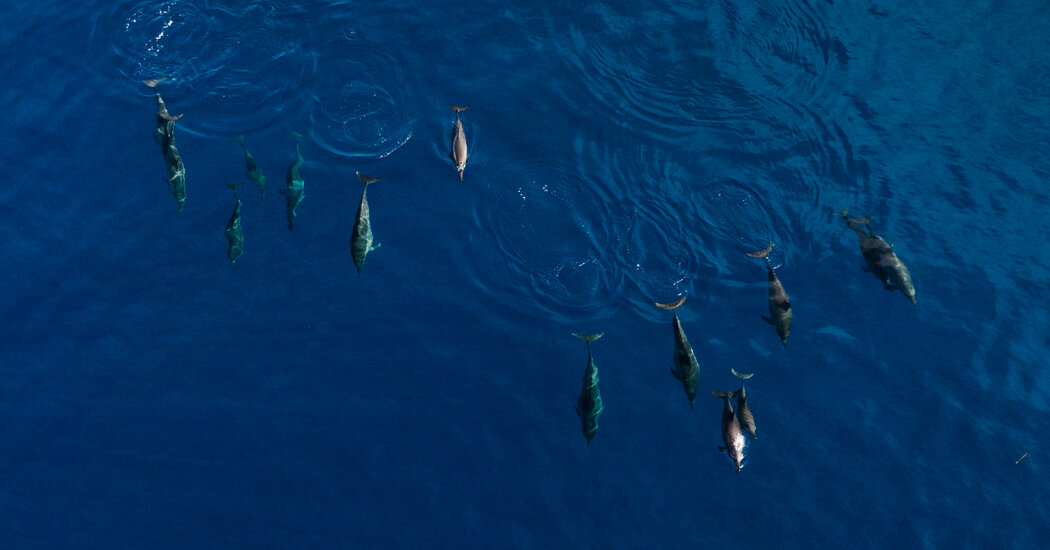The call of a basin of the basin aroused the dolphin hunters of their beds. Under the moonlight, the six men mixed in the village church.
There a priest drove them in a whispered prayer, his voice barely audible on the sound of falling waves; The tide was high that day. Salt water was grouped in some parts of the village, which is on the island of Fanalei, a kind of land that is more and more part of the Solomon Islands of the South Pacific.
They went back to wooden canoes before the first light, cutting in the dark until they were kilometers from the coast. After hours of scanning the horizon, one of the hunters, Lesley Fugi, saw a fin that cut the glass water. He lifted a bamboo pole 10 feet long with a piece of fabric tied at the end, alerting the others to his discovery. Then he made a phone call to his wife. He had found dolphins. Hunting would begin.
These men are among the last dolphin hunters in the islands of Solomon. Some conservationists say the slaughter is cruel and unnecessary. But for the 130 lantern residents, traditional hunting has assumed a renewed urgency as climate change threatens its home. They say they need dolphins for their lucrative teeth, which are used as a local currency, to buy land on a higher ground and escape their home.
Each tooth picks up $ 3 from the Solomon Islands (about $ 0.36), a price established by Fanalei heads, and a single hunting of about 200 dolphins can provide tens of thousands of dollars, more than any other economic activity on the island.
« We are also sorry to kill the dolphins, but we really have no choice, » Fugi said. He would be willing to leave hunting, he added, if there was an alternative way to secure the future of his family.
Crops can no longer be grown in Fanalei, which is about a third of the Central Park size in New York City. The fertile land that has been ruined by salt water. The government has promoted algae agriculture as a source of income, while preservation groups abroad have offered cash to end hunting. But the ocean is still an existential threat and the most profitable resource of villagers. Government investigations suggest that the island could be under water at the end of the century.
« For a low island like ours, we attend our own eyes as the sea rise affects our lives, » said Wilson Filei, the main head of Fanalei.
Over time, the dolphins’ teeth have allowed the villagers to pay a new church, a sea wall and an extension to local elementary school.
During the hunting season, which is from January to April, people can kill up to a thousand dolphins here, but hunters say that the climate is becoming more unpredictable, which makes them more difficult to locate them and catch a pod.
While dolphin meat is eaten and mocked with neighboring islands to eat, nuts and other products, teeth are the real hunting prize. They are used for cultural activities and families of future boyfriends buy the hundreds to give a woman during a traditional bride’s price ceremony.
In recent years, most villagers have fled to a neighboring island. They continue to hunt dolphins from there, saying that they have to buy more land to accommodate those that are left behind and support their growth population.
Dolphin Hunting is a community thing in Fanalei. When the Lord Fugi lifted the flag that morning, a criminal cacophony began. The children climbed trees to see the hunters and encouraged « Kirio » (dolphins in Lau’s local language), so that each resident would know that hunting had begun. Canoes hanging near the coast passed through the waves in the open ocean to help hunters form a semicircle around the dolphins and corral to land.
The teeth, once collected, are shared between each family according to a strict level system: hunters obtain the largest participation (« first prize »); Married men who did not participate achieve the next largest part; And the remaining teeth are divided between widows, orphans and other homes without a male representative.
The leaders of the village also set aside part of the teeth in what they call a « community basket » for important works. One day, they hope this will include the purchase of land to expand a resettlement village on the largest island in the southern Malaita.
These actions have been a major security network for residents such as Eddie Sua and their family. Mr. Sua was once a skilled fisherman and a dolphin hunter who mysteriously paralyzed his neck down two years ago, and since then he has been asleep. These days, during the upper tide, his home flood.
« We must be afraid of these floods, because this is what will act to save our lives, » he said, seeing that salt water licks on the sides of his bed.
The dolphin hunt is very good or « good tamas, » said Mr. Sua’s wife, Florence Bobo, in Pijin’s local language, especially now that her husband is not able to support the family as he did once. They both expect them to finally have enough money to move to the island.
« If we had no dolphin teeth, we would have no choice but to eat rocks, » said Mr. Sua.
But a successful hunting is never a certainty. After discovering the dolphins, the Lord Flee and the other hunters began to beat the fist -sized rocks under the water to drive the poder to the coast. But a devastating passed behind them, the roar of his engine drowned the deaf touches of his rocks. The dolphins spread and the men returned to their hands empty.
In the middle of this year’s season, there was only one successful hunt in the Islands of Solomon, where a village near Fanalei killed more than 300 dolphins.
Experts say it is unclear if dolphin hunting is sustainable. Rochelle Constantine, a marine biologist who teaches at the University of Auckland and Kabini Afia, a climate and environmental researcher in the Solomon Islands, said that some of the most hunted species seem to have healthy populations. But the effects of hunting are still unclear on the most coastal and smaller dolphins.
For the people of Fanalei, the most pressing question is not the future of dolphins: it is their own survival in the face of the growing seas.
« Hunting for dolphins can be our identity, » said the Lord Fugii, « but our life and life of our children, this is important. »














Leave a Reply